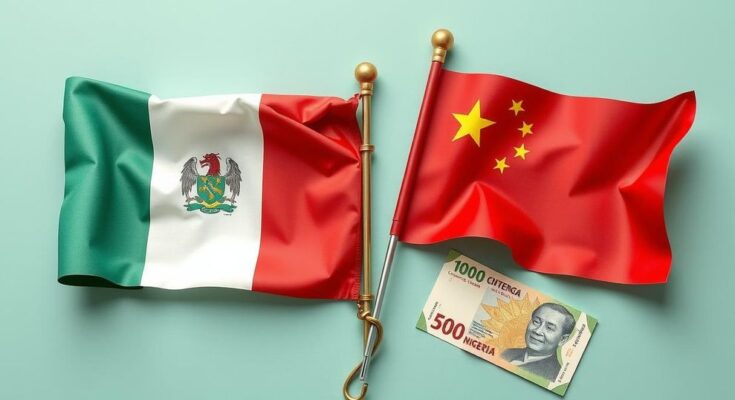China and Nigeria have extended their $2 billion currency swap deal for three years, aimed at bolstering trade and lessening reliance on the U.S. dollar. This comes amid tariff threats from President-elect Trump aimed at BRICS nations. The renewal seeks to address Nigeria’s currency depreciation, but experts emphasize the need for local production strategies for stabilization.
China and Nigeria have renewed their $2 billion currency swap agreement, originally established in 2018, for an additional three years. This renewed arrangement is designed to enhance financial cooperation and foster the utilization of both nations’ currencies, thereby facilitating bilateral trade and reducing the need for U.S. dollars in transactions between the two countries. The People’s Bank of China confirmed the extension, indicating potential for further renewal upon completion of the current term.
The timing of this currency arrangement aligns with tariff threats from President-elect Donald Trump, who warned December 2022 that BRICS nations abandoning the dollar could face restricted access to U.S. markets. In light of Trump’s comments, representatives from South Africa and India have denied any intentions from the BRICS bloc to diminish dollar usage. The renewed swap is anticipated to promote investment and trade while providing liquidity in the local currencies for businesses in both countries.
For Nigeria, the currency swap aims to ease pressure on its external reserves and stabilize foreign exchange rates. Since its establishment, the Nigerian naira has experienced a substantial depreciation, dropping from an exchange rate of 305 naira per dollar in 2018 to nearly 1,000 naira per dollar by late 2022. Following the abandonment of a fixed exchange rate policy in mid-2023, the naira has continued to weaken, prompting experts to question the effectiveness of such measures in strengthening the currency.
Economic analyst Taiwo Oyedele of PWC Nigeria has argued that fostering local production and reducing reliance on imports would provide a more effective long-term solution for stabilizing Nigeria’s currency than a new currency agreement with an industrialized partner like China.
The article discusses the renewal of a currency swap agreement between China and Nigeria, which is an important financial cooperation initiative aimed at facilitating trade between the two nations. The context of this renewal is set against the backdrop of protectionist rhetoric from the incoming U.S. administration, particularly from Donald Trump, who has threatened repercussions for countries moving away from the dollar. The article also touches on the economic challenges facing Nigeria, particularly the depreciation of the naira, and highlights the perspectives of experts regarding effective strategies for currency stabilization.
In conclusion, the renewal of the $2 billion currency swap arrangement between China and Nigeria signals a commitment to strengthen bilateral trade and reduce dependency on the U.S. dollar. However, the ongoing depreciation of the naira poses significant challenges to Nigeria’s economy. While the arrangement may provide some liquidity, experts continue to advocate for more robust economic policies focused on local production to ensure long-term currency stability against foreign pressures. The geopolitical implications of such financial agreements cannot be ignored, particularly in light of the threats issued by the incoming U.S. administration regarding dollar dependency.
Original Source: news.bitcoin.com




